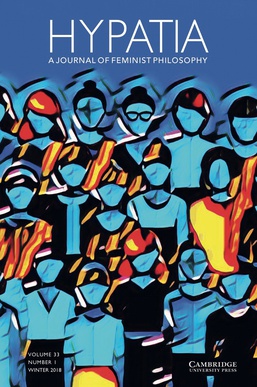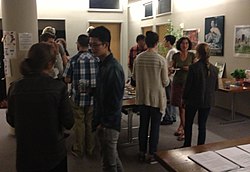Sandra G. Harding is an American philosopher of feminist and postcolonial theory, epistemology, research methodology, and philosophy of science. She directed the UCLA Center for the Study of Women from 1996 to 2000, and co-edited Signs: Journal of Women in Culture and Society from 2000 to 2005. She is currently a Distinguished Professor Emeritus of Education and Gender Studies at UCLA and a Distinguished Affiliate Professor of Philosophy at Michigan State University. In 2013 she was awarded the John Desmond Bernal Prize by the Society for the Social Studies of Science (4S).
Damaris Cudworth, Lady Masham was an English writer, philosopher, theologian, and advocate for women's education who is often characterized as a proto-feminist. She overcame some weakness of eyesight and lack of access to formal higher education to win high regard among eminent thinkers of her time. With an extensive correspondence, she published two works, A Discourse Concerning the Love of God (1696) and Thoughts in reference to a Vertuous or Christian Life (1705). She is particularly noted for her long, mutually-influential friendship with the philosopher John Locke.
Feminist philosophy is an approach to philosophy from a feminist perspective and also the employment of philosophical methods to feminist topics and questions. Feminist philosophy involves both reinterpreting philosophical texts and methods in order to supplement the feminist movement and attempts to criticise or re-evaluate the ideas of traditional philosophy from within a feminist framework.
Women have made significant contributions to philosophy throughout the history of the discipline. Ancient examples include Maitreyi, Gargi Vachaknavi, Hipparchia of Maroneia and Arete of Cyrene. Some women philosophers were accepted during the medieval and modern eras, but none became part of the Western canon until the 20th and 21st century, when some sources indicate that Simone Weil Susanne Langer, G.E.M. Anscombe, Hannah Arendt and Simone de Beauvoir entered the canon.

Diotima of Mantinea is the name or pseudonym of an ancient Greek character in Plato's dialogue Symposium, possibly an actual historical figure, indicated as having lived circa 440 B.C. Her ideas and doctrine of Eros as reported by the character of Socrates in the dialogue are the origin of the concept today known as Platonic love.
Linda Martín Alcoff is a Latin-American philosopher and professor of philosophy at Hunter College, City University of New York. Alcoff specializes in social epistemology, feminist philosophy, philosophy of race, decolonial theory and continental philosophy, especially the work of Michel Foucault. She has authored or edited more than a dozen books, including Visible Identities: Race, Gender, and the Self (2006), The Future of Whiteness (2015), and Rape and Resistance (2018). Her public philosophy writing has been published in The Guardian and The New York Times.
Alison Wylie is a Canadian philosopher of archaeology. She is a professor of philosophy at the University of British Columbia and holds a Canada Research Chair in Philosophy of the Social and Historical Sciences.

Hypatia: A Journal of Feminist Philosophy is a peer-reviewed academic journal published quarterly by Cambridge University Press. As of January 2024, the journal is led by co-editors Katharine Jenkins, Aidan McGlynn, Simona Capisani, Aness Kim Webster, and Charlotte Knowles. Book reviews are published by Hypatia Reviews Online (HRO). The journal is owned by a non-profit corporation, Hypatia, Inc. The idea for the journal arose out of meetings of the Society for Women in Philosophy (SWIP) in the 1970s. Philosopher and legal scholar Azizah Y. al-Hibri became the founding editor in 1982, when it was published as a "piggy back" issue of the Women's Studies International Forum. In 1984 the Board accepted a proposal by Margaret Simons to launch Hypatia as an autonomous journal, with Simons, who was guest editor of the third (1985) issue of Hypatia at WSIF, as editor. The editorial office at Southern Illinois University Edwardsville handled production as well until Simons, who stepped down as editor in 1990, negotiated a contract with Indiana University Press to publish the journal, facilitating the move to a new editor.
Sara Ruddick was a feminist philosopher and the author of Maternal Thinking: Toward a Politics of Peace.
Feminist ethics is an approach to ethics that builds on the belief that traditionally ethical theorizing has undervalued and/or underappreciated women's moral experience, which is largely male-dominated, and it therefore chooses to reimagine ethics through a holistic feminist approach to transform it.
Analytical feminism is a line of philosophy that applies analytic concepts and methods to feminist issues and applies feminist concepts and insights to issues that have traditionally been of interest to analytic philosophers. Like all feminists, analytical feminists insist on recognizing and contesting sexism and androcentrism.
Jennifer Mather Saul is a philosopher working in philosophy of language and philosophy of feminism. Saul is a professor of philosophy at the University of Sheffield and the University of Waterloo.
Alison Mary Jaggar is an American feminist philosopher born in England. She is College Professor of Distinction in the Philosophy and Women and Gender Studies departments at the University of Colorado, Boulder and Distinguished Research Professor at the University of Birmingham in the United Kingdom. She was one of the first people to introduce feminist concerns in to philosophy.
Joan Callahan was a Professor Emerita of Philosophy at the University of Kentucky, an institution where she taught for more than twenty years and served in a variety of roles, including as director of the Gender and Women's Studies Program. Callahan's research has focused on feminist theory, critical race theory, ethics, social and political philosophy, the philosophy of law, and on the junctions of these topics.
Diana Meyers is a philosopher working in the philosophy of action and in the philosophy of feminism. Meyers is professor emerita of philosophy at the University of Connecticut.
Alison Stone is a British philosopher. She is a Professor of European Philosophy in the Department of Politics, Philosophy and Religion at Lancaster University, UK.
Lisa Tessman is a professor of philosophy at Binghamton University. She is also a faculty member in the women, gender, and sexuality studies. She currently teaches graduate programs in social, political, ethical and legal philosophy or SPEL. She also teaches undergraduate programs in philosophy, and philosophy, politics and law or PPL. She received her PhD in philosophy from the University of Massachusetts, Amherst, in 1996. Shared the idea of replacing ones desires and inclininations with the philosopher king does virtue bring this regret from having dealt the self justice
Nancy Tuana is an American philosopher who specializes in feminist philosophy. She holds the DuPont/Class of 1949 Professorship in Philosophy and Women's Studies at The Pennsylvania State University. She came to Penn State from the University of Oregon in 2001 to serve as the founding director of the Rock Ethics Institute. She won the 2022 Victoria Davion Award.


